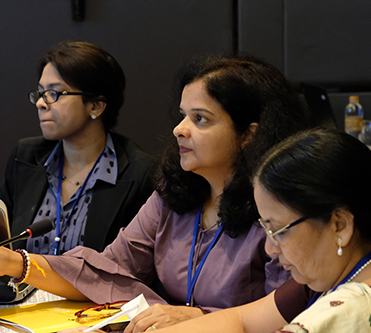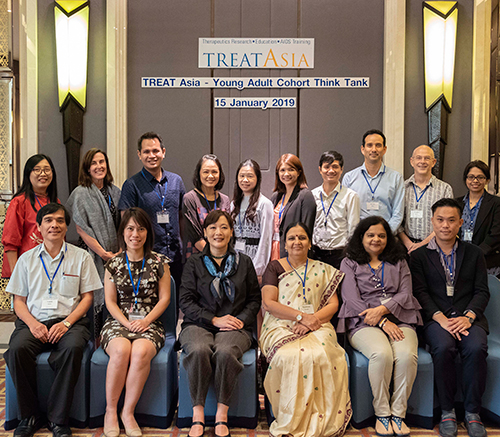 (Left to right) Tulathip Suwanlerk, TREAT Asia; Dr. Tavitiya Sudjaritruk, Research Institute for Health Sciences, Chiang Mai University, ThailandThere has been a slow decline in mother-to-child transmission (MTCT) of HIV in the Asia-Pacific region. Although there are still high rates in other countries, the World Health Organization has certified that Thailand and Malaysia have eliminated MTCT. With this overall declining trend, the number of children and adolescents under care at clinical sites within the TREAT Asia network who were infected with HIV at birth is shrinking. While this is good news, there are increasingly large numbers of young adults in the region with more recently acquired infections.
(Left to right) Tulathip Suwanlerk, TREAT Asia; Dr. Tavitiya Sudjaritruk, Research Institute for Health Sciences, Chiang Mai University, ThailandThere has been a slow decline in mother-to-child transmission (MTCT) of HIV in the Asia-Pacific region. Although there are still high rates in other countries, the World Health Organization has certified that Thailand and Malaysia have eliminated MTCT. With this overall declining trend, the number of children and adolescents under care at clinical sites within the TREAT Asia network who were infected with HIV at birth is shrinking. While this is good news, there are increasingly large numbers of young adults in the region with more recently acquired infections.
In 2017, 30% of new HIV infections in the Asia-Pacific occurred in people aged 15‒24 years.1 And many youth still receive inadequate treatment and suffer poorer outcomes than older adults.
“With much of TREAT Asia’s research now focusing on the transition of adolescents living with HIV from pediatric to adult clinics, we recognize the need to study the broader health outcomes of older adolescents and young adults,” said Dr. Annette Sohn, director of TREAT Asia.
 (Left to right) Dr. Yasmin Gani, Sungai Buloh Hospital, Malaysia; Ms. Smita Nimkar and Dr. Shashikala Sangle, BJ Medical College, IndiaTo this end, a think tank exploring the rationale for and potential scope of a new regional young adult cohort study was organized in Bangkok in January 2019. The meeting was attended by TREAT Asia network clinical care providers and researchers from Cambodia, India, Malaysia, the Philippines, Thailand, and Vietnam—as well as other regional experts.
(Left to right) Dr. Yasmin Gani, Sungai Buloh Hospital, Malaysia; Ms. Smita Nimkar and Dr. Shashikala Sangle, BJ Medical College, IndiaTo this end, a think tank exploring the rationale for and potential scope of a new regional young adult cohort study was organized in Bangkok in January 2019. The meeting was attended by TREAT Asia network clinical care providers and researchers from Cambodia, India, Malaysia, the Philippines, Thailand, and Vietnam—as well as other regional experts.
“It was extremely helpful to come together with other investigators to plan how best to study this vulnerable and changing population. While each country in the region has different HIV policies and varied needs, this think tank has set the groundwork for cohesive research that could substantially improve care and outcomes,” said Dr. Yasmin Binti Mohamed Gani of Hospital Sungai Buloh in Malaysia.
Participants considered data gaps and priorities, and the financial and technical resources required to expand research in this area. Mental health, sexually transmitted infections, stigma, and substance use emerged as priority issues for data collection and future research.

Think Tank participants: (Top row, left to right) Dr. Thida Chanyachukul, TREAT Asia; Dr. Eileen Dunne, Thailand-US CDC Collaboration, Thailand; Dr. Mark Pasayan, Research Institute for Tropical Medicine, the Philippines; Ms. Tulathip Suwanlerk, TREAT Asia; Dr. Tavitiya Sudjaritruk, Research Institute for Health Sciences, Chiang Mai University, Thailand; Dr. Paruspak Payoong, Chiangrai Prachanukroh Hospital, Thailand; Dr. Ngo Van An, Bach Mai Hospital, Vietnam; Dr. Jeremy Ross, TREAT Asia; Dr. Stephen Kerr, HIV-NAT, Thailand; Dr. Yasmin Gani, Sungai Buloh Hospital, Malaysia. (Bottom row, left to right) Dr. Vohith Khol, National Centre for HIV/AIDS, Dermatology and STDs, Cambodia; Dr. Quanhathai Kaewpoowat, Research Institute for Health Sciences, Chiang Mai University; Dr. Annette Sohn, TREAT Asia; Dr. Shashikala Sangle and Ms. Smita Nimkar, B.J. Medical College, India; and Mr. Nuttawut Teachatanawat, Thai Red Cross AIDS Research Centre
“I feel that research now should be tailored to help clinical practice move and change government policies, raise awareness, and support services for this at-risk cohort,” continued Dr. Gani. “We need to look at novel strategies that study the reasons behind poor adherence and poor retention in this population. Many adolescents need help with a smooth transition to adult care, especially those living in shelter homes and without family members to guide them. More often than not these homes provide basic housing but minimal support, mostly due to financial constraints.”
The think tank will inform pilot research aimed at impacting health and legal policies around the management of young adults living with HIV in the Asia-Pacific.
1UNAIDS AIDSinfo